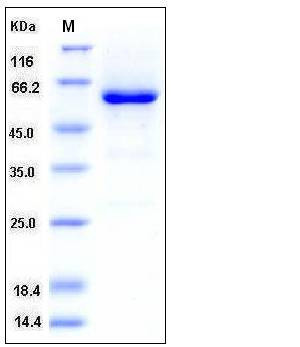Mouse CD73 / NT5E Protein (His Tag)
2210401F01Rik,AI447961,CD73,eNT,NT,Nt5
- 100ug (NPP3244) Please inquiry
| Catalog Number | P50231-M08H |
|---|---|
| Organism Species | Mouse |
| Host | Human Cells |
| Synonyms | 2210401F01Rik,AI447961,CD73,eNT,NT,Nt5 |
| Molecular Weight | The secreted recombinant mouse NT5E consists of 532 amino acids and has a calculated molecular mass of 59.4 kDa which is also detected in SDS-PAGE under reducing conditions. |
| predicted N | Trp 29 |
| SDS-PAGE |  |
| Purity | > 95 % as determined by SDS-PAGE |
| Protein Construction | A DNA sequence encoding the mouse NT5E (NP_035981.1) without the propeptide, corresponding to the amino acid (Met 1-Lys 549) was expressed, with a C-terminal polyhistidine tag. |
| Bio-activity | Measured by its ability to hydrolyze the 5’-phosphate group from the substrate adenosine-5’-monophosphate (AMP). The orthophosphate product is measured by a Malachite Green Phosphate Detection Kit (Catalog # DY996). The specific activity is >10,000 pmol/min/µg. |
| Research Area | Signaling |Signal Transduction |Metabolism |Pathways and Processes |Metabolism processes |Hypoxia | |
| Formulation | Lyophilized from sterile PBS, pH 7.4 1. Normally 5 % - 8 % trehalose, mannitol and 0.01% Tween80 are added as protectants before lyophilization. Specific concentrations are included in the hardcopy of COA. |
| Background | 5'-nucleotidase, also known as NT5E, NTE, and CD73, is a cell membrane protein which belongs to the 5'-nucleotidase family. CD73 is a glycosyl phosphatidylinositol (GPI) anchored purine salvage enzyme expressed on the surface of human T and B lymphocytes. CD73 catalyzes the conversion of purine and pyrimidine ribo- and deoxyribonucleoside monophosphates to the corresponding nucleosides. CD73 serves as a costimulatory molecule in activating T cells. CD73 generated adenosine functions in cell signalling in many physiologic systems, including intestinal epithelium, ischemic myocardium, and cholinergic synapses. CD73 might mediate lymphocyte-stromal cell interactions or condition the local microenvironment to facilitate lymphocyte development and/or function. In CD73-depleted cells, surface levels of the leukocyte adhesion molecules ICAM-1, VCAM-1 and E-selectin increase. CD73 produces extracellular adenosine, which then acts on G protein-coupled purigenic receptors to induce cellular responses. CD73 has also been reported to regulate expression of pro-inflammatory molecules in mouse endothelium. |
| Reference |
